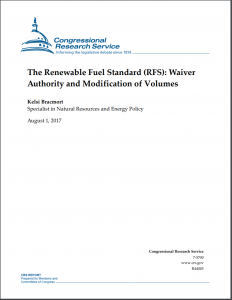Full Title: The Renewable Fuel Standard (RFS): Waiver Authority and Modification of Volumes
Author(s): Kelsi Bracmort
Publisher(s): Congressional Research Service
Publication Date: August 1, 2017
Full Text: Download Resource
Description (excerpt):
The Clean Air Act requires that transportation fuels contain a minimum amount of renewable fuel. This renewable fuel standard (RFS) was established by the Energy Policy Act of 2005 (EPAct05; P.L. 109-58) and amended by the Energy Independence and Security Act of 2007 (EISA; P.L. 110-140). The RFS includes scheduled volume mandates that grow each year (starting with 9 billion gallons in 2008 and ascending to 36 billion gallons in 2022), with the U.S. Environmental Protection Agency (EPA) determining the annual volume amounts following 2022. Within the overall RFS, there are sub-mandates for advanced biofuels, including cellulosic biofuel, biomass-based diesel, and other advanced biofuels. EPA, which is responsible for administering the RFS, has the authority to waive the RFS requirements, in whole or in part, if certain conditions outlined in statute prevail. More specifically, the statute identifies a general waiver for the overall RFS and waivers for two types of advanced biofuel: cellulosic biofuel and biomass-based diesel.
EPA, which is responsible for administering the RFS, has the authority to waive the RFS requirements, in whole or in part, if certain conditions outlined in statute prevail. More specifically, the statute identifies a general waiver for the overall RFS and waivers for two types of advanced biofuel: cellulosic biofuel and biomass-based diesel. Statute requires EPA to announce each year’s standards by November 30 of the previous year, except for biomass-based diesel, which must be announced 14 months before the year for which the applicable volume will apply. Further, the final section of the waiver provision—which some refer to as the “reset” section—requires a permanent modification of applicable volumes of the RFS starting in 2016 and is carried forward, if certain conditions are met. The potential for full or partial RFS waivers can contribute to uncertainty for policymakers, industry, financiers, and other interested parties. Several instances have led to EPA using, proposing to use, or being petitioned to use its waiver authority when implementing the RFS. In July 2017, EPA announced
Several instances have led to EPA using, proposing to use, or being petitioned to use its waiver authority when implementing the RFS. In July 2017, EPA announced in its proposed rule for 2018 for the RFS that it was using the cellulosic biofuel waiver authority to reduce the cellulosic biofuel, advanced biofuel, and total renewable fuel volume requirements. The 2018 proposed rule follows the precedent set in the 2017 final rule, which involved EPA’s use of the waiver authority to reduce the total renewable fuel volume required. EPA’s use of the cellulosic biofuel waiver authority is not new. EPA has repeatedly issued a cellulosic biofuel waiver to reduce the volume required for cellulosic biofuel. For the last few years, the use of the cellulosic biofuel waiver led EPA to also reduce the total advanced biofuel volume requirement. According to the agency, it has used the cellulosic biofuel waiver due to lack of actual domestic production of cellulosic biofuel at the volumes required to meet the RFS cellulosic biofuel mandate. For various reasons, the U.S. cellulosic biofuel industry has been unable, by a wide margin, to produce the volume amounts identified in
EPA’s use of the cellulosic biofuel waiver authority is not new. EPA has repeatedly issued a cellulosic biofuel waiver to reduce the volume required for cellulosic biofuel. For the last few years, the use of the cellulosic biofuel waiver led EPA to also reduce the total advanced biofuel volume requirement. According to the agency, it has used the cellulosic biofuel waiver due to lack of actual domestic production of cellulosic biofuel at the volumes required to meet the RFS cellulosic biofuel mandate. For various reasons, the U.S. cellulosic biofuel industry has been unable, by a wide margin, to produce the volume amounts identified in statute.
The 2017 final rule issued by EPA—like the previous final rule—triggers the RFS “reset” section of the waiver provision for both advanced biofuel and cellulosic biofuel. It is unclear what impact the reset section will have on RFS standards in future years. In July 2017, EPA reported that it will “begin technical analysis to inform a future reset rulemaking action.” This report discusses the process and criteria that EPA may use to waive various portions of the RFS and the reset section and briefly analyzes the potential impacts.
